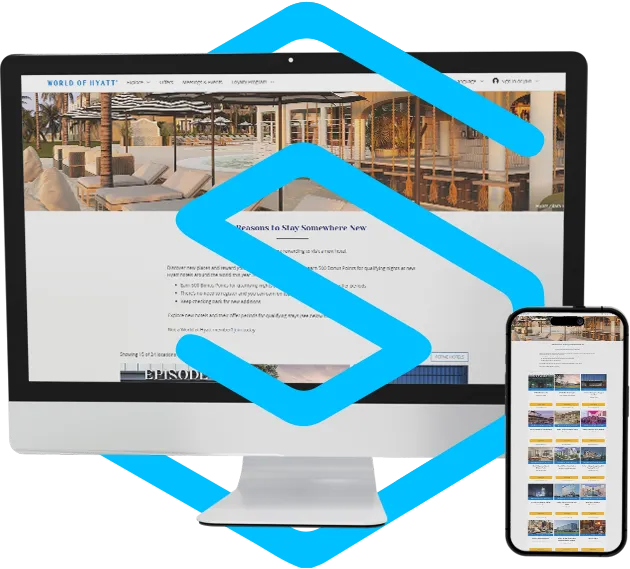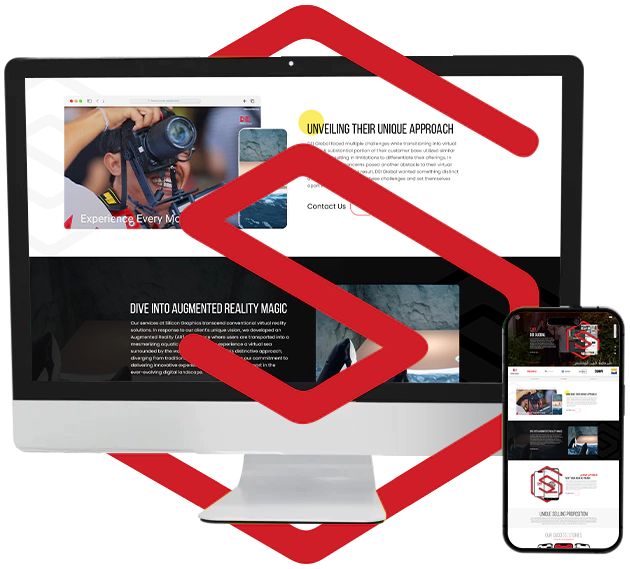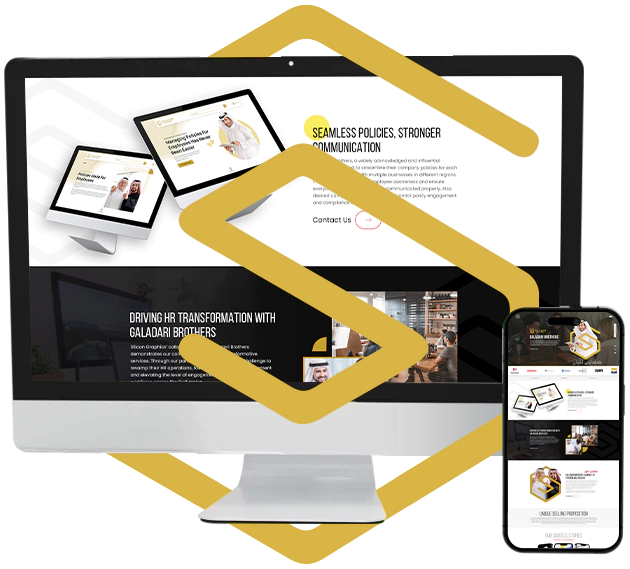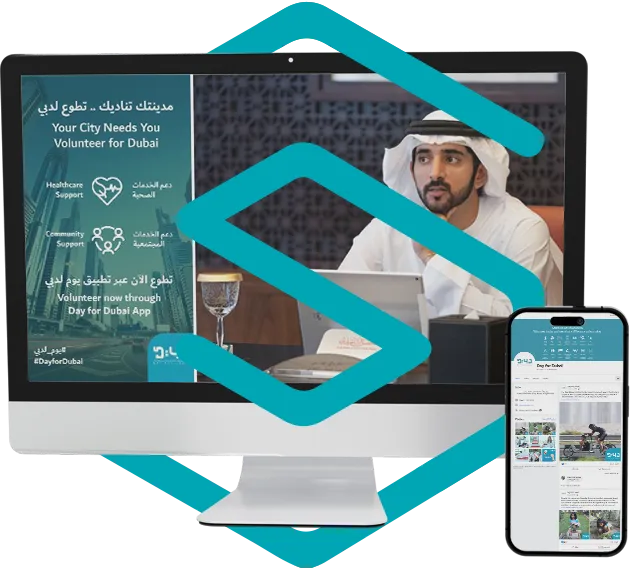
HYATT
Hyatt is a family-built hospitality company founded in 1957 that enriches people’s lifestyle with their outclass products. With 175 hotels and resorts worldwide, Hyatt aims to bring people together and help them connect.
Check How HYATT Achieved 57% Organic Traffic in Five Months.
View Case Study

DEI Global
Founded in 2004, DEI is the market leader in imaging services and solutions. DEI aims to transform invaluable moments into valuable memories. The company has presence in 21 countries with regional offices in cities including Orlando, Mumbai, Hong Kong SAR, Singapore, Malaysia, Shanghai, and headquarters in Dubai. As part of Fairfax Financial Holdings Limited, DEI constantly innovates to enhance guest experiences.
DEI Global faced multiple challenges while transitioning into virtual reality. Silicon Graphics, a trusted partner, transformed client’s vision into virtual sea by delivering innovative experiences that set our clients apart in the ever-evolving digital landscape.

Karen Millen
Karen Millen is a modern clothing brand for women that creates an all-inclusive and trendsetting piece of clothing that stands out at every occasion.
Check How Karen Millen Achieved 81% Organic Traffic in Six Months.
View Case Study

Galadari Brothers
For over 50 years, the Galadari Group has been leading the charge in driving transformation and innovation in an ever-changing world. Their companies, agents of change, create opportunities and enable possibilities across industries and communities.
Galadari Brothers wanted to streamline their company policies for each region after dealing with multiple businesses in different regions. In response, Silicon Graphics crafted an internal HR portal that centralized all company policies, ensuring easy accessibility for employees throughout the Gulf region.

معاملات آمنة

NOGODI Fintech
Nogodi approached Silicon Graphics to develop an application that would mediate buyers and sellers and ensure secure transactions. The smart mediator application allows the buyers to buy from unknown sellers and make secure transactions as the application gives direct access without any third-party intervention. It guarantees a safe transaction where the money will be held until the buyer is satisfied with the purchase.
View Case Study

Day For Dubai
Day for Dubai is an initiative launched by Sheikh Hamdan bin Muhammed bin Rashid Al Maktoum, the Crown Prince of Dubai and Chairman of the Executive Council. The organization invites the people living in Dubai to spend a day with those in need. The Non-Profit Organization approached Silicon Graphics to build a robust application where people can commit a day to volunteer in Dubai.
View Case StudyOur Blogs مدوناتنا
Learn more about the latest trends, updates, news, and develop an understanding of
what’s happening around you in the digital world.
Create YouTube Ads Like a Pro in 10 Simple Steps
If you want to reach millions of users, YouTube ads are one of the best ways to do it. Businesses of every size use YouTube to promote products, build awareness, and drive conversions. But not every ad performs well. The key is knowing how to plan and execute it correctly. At Silicon Graphics AE, our digital marketing experts specialize in YouTube marketing strategies that help brands create high-performing video campaigns. This guide breaks down 10 simple steps to help you create YouTube ad campaigns like a pro. Why YouTube Ads Work YouTube reaches over two billion users monthly, making it the second most-visited site in the world. Unlike traditional TV ads, YouTube ads give precise targeting, flexible budgets, and measurable results. With video content dominating online engagement, brands that master YouTube marketing gain a major edge. These ads build trust faster, increase brand recall, and drive users to act. Step 1: Define Your Campaign Objective Before jumping into production, be clear about what you want your ad to achieve. Do you want brand awareness, website traffic, or conversions? Each goal requires a different creative and targeting approach. For example: Awareness campaigns focus on storytelling and visuals. Conversion campaigns emphasize strong calls to action. A well-defined goal ensures your YouTube ads reach the right audience with the right message. Step 2: Know Your Audience Understanding your audience is critical in YouTube marketing. You can target users by age, location, interests, behavior, or even specific search terms. Create buyer personas to guide your tone and messaging. For instance, an ad for software developers should sound different from one for fitness enthusiasts. The better you know your audience, the stronger your engagement. Step 3: Choose the Right Ad Format YouTube offers multiple ad formats. Choosing the right one depends on your campaign goal and budget. Skippable ads: Viewers can skip after five seconds. Good for awareness. Non-skippable ads: Force full view but need strong storytelling. Bumper ads: Six-second ads ideal for quick impressions. In-feed video ads: Appear in YouTube search results. For beginners, skippable ads are often the best starting point. They balance visibility and cost-effectiveness. Step 4: Plan a Compelling Script Your script decides whether viewers stay or skip. Start with a strong hook in the first five seconds. Viewers decide almost instantly if they’ll continue watching. Keep your message short, clear, and conversational. Address the viewer’s pain point early and offer value. When you create YouTube ad content, focus on what problem your product solves rather than listing features. Step 5: Keep It Visually Engaging Video quality matters. Clear visuals, steady framing, and good lighting can instantly improve ad performance. Use high-contrast colors and readable text to grab attention on mobile screens. Mix visuals with motion graphics or subtitles to maintain interest. Professional YouTube ad creation tips recommend including your brand logo early, but naturally, avoid overpromotion. Step 6: Optimize the Sound and Voice Audio clarity is just as important as visuals. Many ads lose impact due to poor sound mixing. Use crisp voiceovers and background music that matches your message tone. Test different voice styles. For storytelling ads, a warm, friendly voice works best. For tech or business ads, a confident and professional tone fits better. Make sure your YouTube ads sound as good as they look. Step 7: Add a Strong Call to Action Every ad needs a next step. Tell viewers exactly what you want them to do—visit your website, subscribe, download, or buy. Your CTA should appear both visually and verbally. For example, a voiceover saying “Try it now” while a clickable button appears reinforces the message. Strong CTAs are the backbone of effective YouTube marketing campaigns. Step 8: Set Up Smart Targeting Once your ad is ready, it’s time to choose who sees it. YouTube lets you target by interests, keywords, or even placements on specific videos or channels. Use keyword targeting to match viewer intent. For instance, if your ad promotes workout gear, target users who watch fitness tutorials. You can also create custom audiences by uploading your customer lists or remarketing to past visitors. Smart targeting reduces wasted spend and boosts engagement. Step 9: Test and Measure Results The best YouTube ad creation tips emphasize testing. Never assume one version of your ad will perform perfectly. Run A/B tests with different headlines, visuals, or CTAs. Track performance through metrics like: View-through rate (VTR) Click-through rate (CTR) Conversion rate Testing helps refine your YouTube ads over time, ensuring higher ROI and better targeting. Step 10: Refine and Scale Your Campaign Once you identify what works, double down on it. Use the analytics data to refine your targeting, adjust your bid strategy, and update your creative. Successful YouTube marketing is all about iteration. Even small changes, like altering background music or shortening scenes, can improve performance. When you find a winning formula, scale your campaign to new geographies, languages, or audience segments to grow your reach efficiently. Bonus: Tips for Better YouTube Ad Creation Here are some expert YouTube ad creation tips from professionals at Silicon Graphics AE: Hook Early: Capture attention within the first five seconds. Keep It Short: Ads under 30 seconds perform best for engagement. Use Real People: Authentic storytelling beats overly scripted performances. Optimize for Mobile: Most viewers watch on phones. Use vertical-friendly visuals. Highlight Emotions: People remember feelings more than facts. Even subtle improvements can make your create YouTube ad project stand out. Example of a Great YouTube Ad Take the “Dove Real Beauty” campaign. It focused on emotions, authenticity, and identity rather than product features. The ad resonated with millions because it connected on a human level. Strong storytelling remains one of the best YouTube ad creation tips for all industries. Whether you sell software or skincare, make the viewer feel something. How Much Does It Cost to Run YouTube Ads? The YouTube ads pricing model works on a cost-per-view (CPV) or cost-per-thousand impressions (CPM) basis. On average: CPV ranges between $0.05 – $0.30 per view. CPM averages between
The Ultimate Guide to User-Friendly Web Design for Startups
Launching a startup means juggling endless tasks. Between finding clients, building products, and pitching to investors, your website might seem secondary. But here’s the truth, your web design is often the first real conversation users have with your brand. A confusing or outdated site can undo months of effort. This guide breaks down everything a startup needs to know about web design and development. From structure to usability, performance to accessibility, we’ll cover what makes a website not just look good, but feel right for your audience. Why User Experience Defines a Startup’s Success When people land on a startup’s website, they form an opinion within seconds. That snap judgment is based largely on web design, not product quality or pricing. Design sets the tone for trust. For startups, this matters because early impressions determine whether visitors explore your offer or bounce away. A user-friendly design helps: Build instant credibility with potential customers Reduce confusion and friction during navigation Guide visitors naturally toward key actions like sign-ups or demos A great design doesn’t shout; it quietly works in the background, making every click effortless. The Core Idea Behind User-Friendly Design User-friendly design is about empathy. It’s not about colors or fonts it’s about making digital interaction easy and predictable. When planning web design services, think like your audience: What are they here to do? How fast can they find it? Does every page feel connected and logical? Startups that answer these questions early save thousands later on unnecessary redesigns. Understanding the Connection Between Design and Development Web design and development are often used interchangeably, but they serve different roles. Design focuses on look and feel. Development ensures functionality, speed, and structure. Good design without solid web development is fragile. Likewise, strong code without thoughtful design feels robotic. A balance between both ensures users get an experience that’s visually appealing and technically sound. At Silicon Graphics AE, teams often bridge these two worlds, ensuring what’s designed actually performs as intended. Principles of User-Friendly Web Design Whether you’re hiring web design services for startups or handling it in-house, the same principles apply. 1. Simplicity People come to your site for a reason. Remove distractions. Avoid clutter. Use white space generously. 2. Visual Hierarchy Headings, colors, and spacing guide the eye. Highlight what’s most important, your product, pricing, or contact button. 3. Consistency Users should never feel like they’ve landed on a different site when they switch pages. Keep fonts, layouts, and colors aligned. 4. Accessibility Every visitor should be able to use your website. Include alt text for images, contrast for text, and keyboard-friendly navigation. 5. Feedback When users click a button or submit a form, show them what’s happening, loading animations or confirmation messages make a big difference. These design fundamentals are universal across industries, but startups, in particular, benefit from getting them right the first time. Responsive Web Design: Why It’s Non-Negotiable Over half of all web traffic comes from mobile devices. If your site doesn’t adjust properly on smaller screens, users won’t stay. That’s where responsive web design comes in. It ensures your layout, images, and text adapt seamlessly to different screen sizes. No pinching or zooming just natural usability. Responsive design benefits include: Improved SEO ranking (Google prioritizes mobile-friendly sites) Higher engagement and time on page Lower bounce rates and better conversion rates Easier future maintenance In short, responsive web design is not a feature it’s a foundation. How Web Development Shapes User Experience While design captures attention, web development defines reliability. Users notice when things break buttons don’t work, pages load slowly, or forms fail to submit. To prevent that, startups should focus on: Fast loading speeds (under 3 seconds ideally) Clean, semantic code Secure servers and updated plugins Consistent browser compatibility Logical site architecture Good web development also supports future growth. As your startup scales, your website should handle more pages, users, and integrations without crashing. Building for Clarity, Not Complexity Startups often try to impress with flashy visuals, but simplicity wins. Users prefer clarity over creativity when it comes to functionality. Here’s what to prioritize: Clear menus with descriptive labels Prominent CTAs like “Get Started” or “Request Demo” Readable text (avoid light fonts on bright backgrounds) Logical flow from homepage to product pages When web design services focus on clarity, conversion rates rise naturally. Common Web Design Mistakes Startups Should Avoid Startups often make similar design errors during early stages: Too many visual elements: Clutter distracts users. Ignoring mobile layouts: Non-responsive sites lose half their audience. Slow loading speeds: Every extra second costs conversions. Inconsistent branding: Different fonts or colors confuse visitors. No clear CTA: Users leave if they don’t know what to do next. Avoiding these issues can set your brand apart instantly. Many startups underestimate how much clean web design and development impact first impressions. The Role of Content in Effective Web Design A user-friendly site isn’t just about visuals content plays an equal role. Clear, human writing keeps people engaged. Tips for better website content: Write short sentences. Use simple vocabulary. Avoid jargon and filler words. Break long text into small sections. Pair good content with effective web design services, and your message becomes memorable. SEO and Web Design: Working Hand in Hand Search visibility is built into the design, not added later. Startups should integrate SEO during web design and development rather than after launch. Key SEO design practices include: Optimized meta titles and descriptions Mobile-friendly layouts (thanks to responsive web design) Alt tags for every image Fast loading speeds Logical internal linking The technical and creative sides must work together when done right; your website becomes both discoverable and enjoyable. Navigation: The Hidden Hero of Web Design Navigation might seem basic, but it’s one of the biggest drivers of user satisfaction. A well-structured menu keeps people exploring instead of leaving. Best practices: Keep the top-level menu short (5–7 items) Group related pages under clear labels Use breadcrumbs on deeper pages Add a search bar for large websites Visitors should
Hire an Ecommerce SEO Specialist to Maximize Your Store Traffic
Running an online store is about more than adding products and waiting for visitors. To grow, you need people who find you through search. That’s where ecommerce SEO comes in. Optimizing your store for search engines brings long-term visibility and consistent sales. The key to making this work is hiring an ecommerce SEO specialist. They understand how to fix technical issues, build the right keyword structure, and increase conversions. In this guide, we’ll explore how they can transform your traffic, how ecommerce SEO Dubai experts work, and why technical SEO ecommerce, and agency partnerships matter. Understanding the Need for an Ecommerce SEO Specialist The Growing Importance of Ecommerce SEO Ecommerce websites face tougher competition every year. Thousands of stores sell similar products, so getting seen depends on ranking higher in search results. That’s why an ecommerce SEO specialist is not optional anymore. They make sure every product page is optimized, every image is tagged, and your site structure is easy to crawl. Without this, even great products stay invisible to potential buyers. What Makes Ecommerce SEO Different Ecommerce SEO is not like regular website optimization. Product categories, filters, pagination, and customer reviews create complex technical setups. A normal SEO approach won’t solve them. An ecommerce SEO specialist knows how to handle structured data, duplicate pages, and product-specific schema. Their goal is to make every product discoverable to both users and search engines. The Business Impact Good ecommerce SEO brings measurable growth. Better rankings lead to more visitors, more time spent on site, and higher conversion rates. A small improvement in visibility can mean thousands of dollars in extra sales. Brands that invest early in specialized SEO often outperform competitors who rely only on ads. At Silicon Graphics AE, we’ve seen stores grow their organic traffic by fixing the fundamentals, category structures, internal links, and metadata. Ecommerce SEO Dubai: Why Regional Knowledge Matters Local Search Patterns in Dubai The UAE’s ecommerce market is unique. Shoppers mix English and Arabic queries, and often search by brand or product type. A regular SEO campaign may not work well here. That’s where ecommerce SEO Dubai specialists come in. They understand the market’s bilingual nature, mobile-first behaviour, and competitive industries like fashion, electronics, and beauty. They also know what local shoppers expect, speed, trust, and local payment options. Tailoring Strategy to the Region To succeed in Dubai or the wider GCC, your SEO must reflect cultural and technical nuances. This means translating keywords properly, optimizing for both English and Arabic, and integrating local payment pages. An ecommerce SEO Dubai professional also considers logistics, delivery times, store policies, and customer experience. These affect bounce rate and conversion signals, which search engines track closely. Real-World Results When regional expertise meets global SEO practices, results multiply. Local targeting increases visibility among high-intent buyers searching within the UAE. At Silicon Graphics AE, we combine this understanding with technical SEO to build strategies that actually convert visitors to customers. The Role of Technical SEO in Ecommerce Why Technical SEO Matters A great product catalog means little if your site loads slowly or search engines can’t crawl it. Technical SEO ecommerce ensures your store is built for performance. It focuses on the site’s foundation, speed, structure, and indexability. When pages load fast and are easy to navigate, users stay longer and buy more. Google rewards these signals with better rankings. Key Areas of Technical SEO Ecommerce An ecommerce SEO specialist reviews multiple elements: internal linking, canonical tags, structured data, and site speed. They check how crawlers move through the website, ensuring no product is hidden behind unnecessary parameters or redirects. They also optimize images, manage broken links, and ensure the site works smoothly on mobile. This keeps both users and search engines happy. Tools and Techniques Used Experts use tools like Google Search Console, Screaming Frog, and site audit platforms to identify problems. Fixing issues such as duplicate titles, incorrect canonical tags, and crawl depth helps maximize organic visibility. Technical SEO also includes managing URL structures. For example, “/products/shoes” should not compete with “/shop/shoes?color=red.” The specialist ensures only the main pages are indexed. Working with an Ecommerce SEO Agency The Value of a Team Approach Sometimes, you need more than one expert. That’s where an ecommerce SEO agency helps. It brings together specialists in content, analytics, and development under one strategy. Agencies can handle full-scale projects, from audits to link building to monthly reporting. This saves time for store owners who can’t manage each aspect internally. Choosing the Right Agency Not all agencies understand ecommerce challenges. Before hiring, look at their case studies, ask about their platform experience (Shopify, Magento, WooCommerce), and see if they’ve worked in your region. A reliable ecommerce SEO agency focuses on measurable goals like traffic, revenue, and ROI. They avoid vanity metrics and keep communication transparent. Silicon Graphics AE’ Approach Our process combines technical audits, keyword research, and content optimization. We tailor strategies for ecommerce brands across Dubai and the GCC. Our goal is simple: increase visibility and revenue through clear, data-backed SEO. We ensure each client’s platform is technically sound, content aligns with search intent, and local visibility keeps improving month after month. How to Measure Ecommerce SEO Success Key Performance Indicators When you hire an ecommerce SEO specialist, results appear gradually but consistently. You’ll see changes in several metrics, organic traffic, keyword rankings, and conversion rates. A steady increase in organic sales signals your SEO strategy is working. Technical improvements like better crawl rates and faster load times also contribute to long-term success. Tracking Tools and Reports Using Google Analytics, Search Console, and third-party tools, specialists monitor your performance. They compare keyword gains, track impressions, and identify high-converting product pages. The best specialists explain their findings in plain language, showing how technical fixes and content changes translate into real revenue. Continuous Improvement Ecommerce SEO isn’t a one-time effort. Algorithms, competitors, and buyer behavior keep evolving. That’s why consistent monitoring is key. An ecommerce SEO agency or consultant should regularly audit the site, test
















